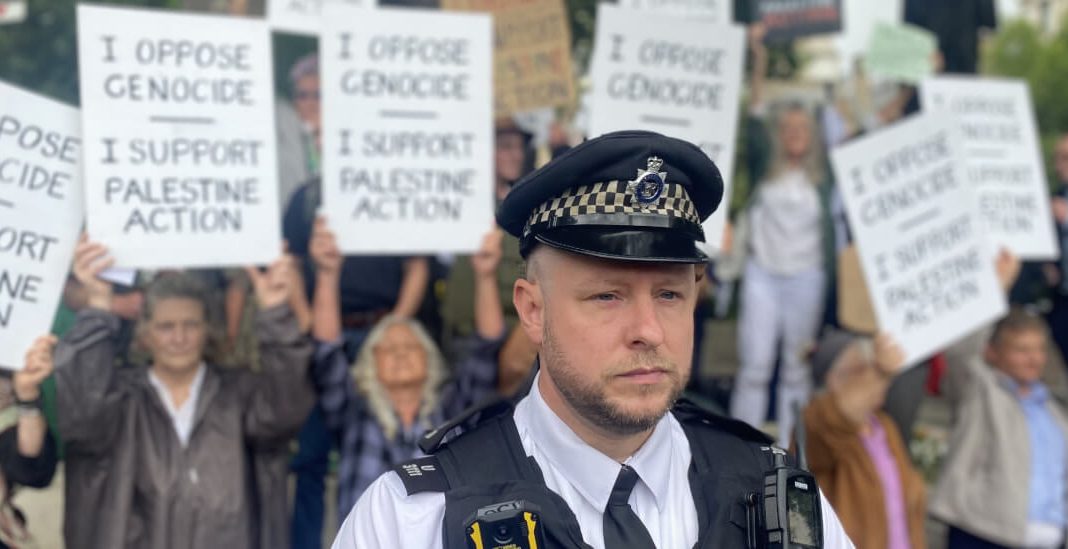As FRFI 307 goes to press, more than 200 people have so far been arrested across the country for displaying placards supporting Palestine Action in protests against its proscription under the Terrorism Act (TA) 2000. They face the possibility of six months’ imprisonment or a substantial fine if found guilty under Section 13 of the Act. Now the main organisers of these protests, Defend Our Juries, is calling for 500 volunteers to take similar action on 9 August. There seems little doubt, given the situation in Gaza and the collusion of the British Labour government in the genocide, that it will find plenty of supporters willing to be arrested.
This increasingly popular approach to organising against British support for genocide needs some examination. Those participating in the protests are rightly appalled at the situation of continuous murder in Gaza, and the Israeli campaign of starving the people into submission. They are outraged at the collusion of the Labour government, and its refusal to take any action against the barbarism of the Israeli state, its denial that there is a genocide taking place or that the Israeli state commits war crimes on an hourly basis.
The official leadership of Palestine solidarity in Britain has so enfeebled or hobbled the movement that it is unable to offer a meaningful challenge to the genocidal Labour government and will clearly not take any action to oppose the proscription of Palestine Action, to which it has only ever given the smallest measure of grudging support. The Palestine Solidarity Campaign (PSC) has failed to target the British state, refused to stand with the Palestinian resistance and, when ordered not to start a protest march outside the BBC, meekly complied. It has limited its opposition to state repression by focusing solely on the cases of two of its leaders, Ben Jamal and Chris Nineham, charged with public order offences. It has relentlessly policed the movement to ensure it remains respectable, treating Palestinian people primarily as victims and therefore as objects of charitable concern rather than as active agents in their own liberation.
The PSC coalition cannot be expected to oppose the ban and Defend Our Juries has stepped into the breach. Calling for 500 volunteers to publicly defy the law on 9 August and more in coming weeks, however, requires an over-arching strategy. Will that strategy include, for instance, opposition to the TA 2000 in general as an instrument of racist repression, as well as to the proscription of Palestine Action? Will it link up with all those facing TA 2000 charges for reasons not associated with Palestine Action? What will its relationship be to the fight against increased state repression in general? When participants are arrested, they are likely to be subjected to oppressive bail conditions which may be maintained for a year or more before charge or trial. These conditions can include being banned from city centres and prohibited from participating in any pro-Palestine activity such as meeting and demonstrations. Unless these are strenuously contested and challenged in court, the impact will be to remove defendants from active participation in building Palestine solidarity. Participants should know what strategy is in place for legal and political defence and have confidence that protests outside police stations and court hearings will be organised. What happens with defendants who are charged but denied legal aid? Will they be supported financially? And finally, if convicted under Section 13, what support will be in place to either help pay fines or provide solidarity and support for prisoners? All this should not simply be left to individuals to navigate.
These are important questions which the movement will need to address if it is to take the solidarity movement forward. One thing is certain: if this civil disobedience campaign grows, it will have to be prepared to face down a vicious campaign of vilification from the media and the Labour government.
Robert Clough
Fight Racism! Fight Racism! 307, August/September 2025




